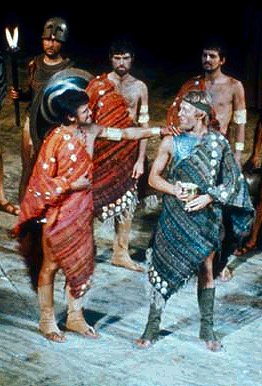A degenerate world
Today, when the astonishing tragical satire of
Troilus and Cressida is part of playgoing life, we find it hard to
recall its years as a rarity. The Old Vic did not stage it until the First
Folio tercentenary year, 1923. Though in 1913 Poel had brought to Stratford his
highly personal treatment, with the young Edith Evans as Cressida, the play was
not in a full Festival programme until 1936: a static performance relieved by
the lisping Cressida of the 18-year-old Pamela Brown - "a woeful Cwessid 'mong
the mewwy Gweeks" - and the drive of Wolfit's Ulysses. Soon afterwards, with an
even more striking Ulysses (Robert Speaight), there was a celebrated
modern-dress production in London, Michael MacOwan's, its effect heightened by
the time, just after the Munich pact: the cry against "cormorant war" was
startlingly topical.
Since then we have grown used to Troilus, the great
contention over Argive Helen turned to the mocking cry, "Lechery! still wars
and lechery! Nothing else holds fashion!" Guthrie, at the Old Vic in 1956,
showed the Trojans to be plagued by frivolity, the Greeks by domestic dispute:
he exposed the Homeric heroes' feet of clay in what turned out to be a struggle
between Ruritania and a coalition of Central European Powers about 1913. In
some ways a grand night; but with the intricate and passionate poetry played
down, it was not the true Troilus.
Two Stratford revivals of the present decade have
brought the piece to us sharply. The directors - in the first version, Peter
Hall and John Barton; later Mr Barton alone - had the Cambridge background of
the Marlowe Society where Troilus has always been prized. During 1960, and in
London a couple of years later, we had the symbolic sand-strewn cockpit that
represented the plains of Troy: Cressida's phrase stung, "As false as ......
sandy earth." Now, at the Aldwych, we have Mr Barton's uncompromising new
treatment which, though I like it less than the cockpit Troilus, has grown
excitingly since Stratford.
We shall never know what prompted Shakespeare to
turn, with a kind of loathing derision, against the myth that had moved him in
his youth when he could write in Lucrece of "the walls of strong
besiegèd Troy when their brave hope, bold Hector, marched to field." We
know only that in Troilus and Cressida all is turned awry. It is a degenerate
world where though true chivalry and true love can gleam for a moment, above
all must rise the croak of "Wars and lechery!" Nothing else holds fashion; and
Mr Barton brings the symbols together at the end of a night that, though quite
as ruthless as before, has fewer signs of effort.
The production has played itself in; I noticed, in
particular, how Sebastian Shaw had matched himself to the ice-flower speeches
of Ulysses. His laughter is now a mocking commentary upon the anger of deceived
Troilus, a passage that comes over forcibly: Michael Williams is a Troilus cut
to the heart, and he can transform that curiously phrased speech,
"To make
a recordation to my soul."
Helen Mirren, even if she has still to develop as
a verse-speaker, expresses lucidly the mind of a girl who is every man's
Cressida. At the moment her love for Troilus is true; but she can easily be
deflected by the next man, and she recognises her own character: "Minds sway'd
by eyes are full of turpitude." She is not for Troilus:
"My love with words and errors still she
feeds,
But edifies another with her deeds."
He is seeing Cressida as the much more superficial
Claudio in Much Ado About Nothing imagined he saw Hero: "She's but the sign and
semblance of her honour."
|
Greeks and Trojans are defined more swiftly
than they were last year. I wanted to applaud Clifford Rose's Nestor, a part I
have known tediously overstrained, piping and whistling in the sound; here
Nestor reaches us as the good old chronicle that "hast so long walk'd hand in
hand with time". Patrick Stewart's Hector, reminding us of the "great morning"
of a day that has ebbed to sulky twilight, is a figure of chivalry defeated. I
wish I could agree with the director's treatment of the epicene Achilles: Alan
Howard gets away with it, but once the point is made, there is no need to hit
it again and again. If I did not know Mr Barton's independence, I might have
thought he had been reading the inevitable Jan Kott who speaks of Achilles as
"boastfull, stupid and quarrelsome like an old hag". Norman Rodway's
Thersites is tiring: a disheartening part, hammered fiercely in manner and
aspect. When Poel, capriciously, cast a woman for Thersites in 1912, he said,
"A man would be sure to over-act."
David Waller manages an anxiously flouncing
Pandarus. In future I may think first of what someone has called unkindly "the
Turkish-bath Troilus" - its dressing is markedly exigious - for Mr Barton's
atmospherics, for the prologue, like a figure from a vase painting turned to an
animated sneer: for the sustained invention that keeps the play running
fluently; and for the looming menace, the rhythm and ritual, of the final
battle scenes so often allowed to droop and trail into nothing.
|

|
Mr Barton has a strong visual sense. It is a
terrifying moment when the Myrmidons, figures of doom with Achilles behind
them, like an emanation from the Pit, turn upon the encircled Hector. Much of
the play does come to us now more searchingly than it did last year. "This love
will undo us all", says Helen; and she should know. In love and war all's fair;
now they are clapper-clawing one another.
J.C. Trewin
Illustrated London News, 5.7.69.
Playing
Shakespeare/Troilus and Cressida
